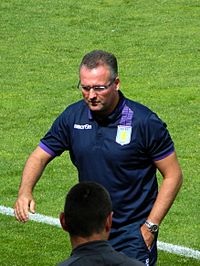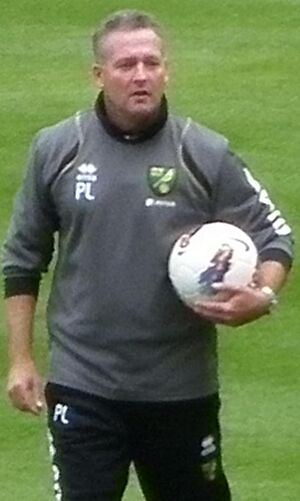Paul Lambert facts for kids

Lambert in 2013
|
|||
| Personal information | |||
|---|---|---|---|
| Full name | Paul Lambert | ||
| Date of birth | 7 August 1969 | ||
| Place of birth | Glasgow, Scotland | ||
| Height | 5 ft 11 in (1.81 m) | ||
| Position(s) | Midfielder | ||
| Team information | |||
|
Current team
|
Al-Shabab (assistant manager) | ||
| Youth career | |||
| 1985–1986 | St Mirren | ||
| Senior career* | |||
| Years | Team | Apps | (Gls) |
| 1986–1993 | St Mirren | 227 | (14) |
| 1993–1996 | Motherwell | 103 | (6) |
| 1996–1997 | Borussia Dortmund | 44 | (1) |
| 1997–2005 | Celtic | 193 | (14) |
| 2005–2006 | Livingston | 7 | (0) |
| Total | 574 | (35) | |
| International career | |||
| 1990 | Scottish League XI | 1 | (0) |
| 1991–1992 | Scotland U21 | 5 | (2) |
| 1995–1996 | Scotland B | 2 | (2) |
| 1995–2003 | Scotland | 40 | (1) |
| Managerial career | |||
| 2005–2006 | Livingston | ||
| 2006–2008 | Wycombe Wanderers | ||
| 2008–2009 | Colchester United | ||
| 2009–2012 | Norwich City | ||
| 2012–2015 | Aston Villa | ||
| 2015–2016 | Blackburn Rovers | ||
| 2016–2017 | Wolverhampton Wanderers | ||
| 2018 | Stoke City | ||
| 2018–2021 | Ipswich Town | ||
| 2025– | Al-Shabab (assistant) | ||
| *Club domestic league appearances and goals | |||
Paul Lambert (born August 7, 1969) is a Scottish football manager and former player. He is currently an assistant manager for Al-Shabab in Saudi Arabia.
Lambert played as a midfielder. He won the Scottish Cup with St Mirren when he was just 17 years old. He also won the UEFA Champions League with Borussia Dortmund. With Celtic, he won many Scottish trophies. Paul Lambert played 40 games for the Scotland national team and was part of the squad for the 1998 FIFA World Cup.
As a manager, Lambert helped Norwich City get promoted twice in a row. This took them all the way to the English Premier League. He also managed other big clubs like Aston Villa, Blackburn Rovers, Wolverhampton Wanderers, Stoke City, and Ipswich Town.
Contents
Paul Lambert's Playing Career
Starting at St Mirren
Paul Lambert was born in Glasgow, Scotland. He started his professional football career with St Mirren in 1985. When he was only 17, he helped St Mirren win the 1987 Scottish Cup Final. This was a big achievement for such a young player. He played for St Mirren for eight years.
Moving to Motherwell
In 1993, Lambert joined Motherwell. The team did very well, finishing second in the Scottish Premier League in the 1994–95 season. This was their best finish in many years. Motherwell also played in the 1994–95 UEFA Cup against the German team Borussia Dortmund. This game impressed Dortmund's manager. Lambert was named Motherwell's Player of the Year in 1996.
Winning the Champions League with Borussia Dortmund
After leaving Motherwell, Paul Lambert joined Borussia Dortmund in Germany. The team's manager, Ottmar Hitzfeld, remembered Lambert from their previous match. Even though another big player, Paulo Sousa, joined at the same time, Lambert played well and earned his spot.
In the 1996–97 UEFA Champions League, Dortmund reached the final. They played against Juventus, a very strong team. Lambert played as a defensive midfielder and did a great job stopping Juventus's star player, Zinedine Zidane. He also helped set up the first goal for Dortmund. Dortmund won the final 3–1. Paul Lambert became the first British player to win the Champions League with a non-UK team. His performance in the final was highly praised. He left Dortmund in November 1997 to be closer to his family in Scotland.
Success at Celtic
In November 1997, Lambert returned to Scotland and joined Celtic. He quickly became a key player. In his first season, he helped Celtic win the Scottish league title. This was Celtic's first league title in ten years. It also stopped their rivals, Rangers, from winning ten titles in a row.
During his seven years at Celtic, Lambert won many trophies. He won four Scottish league titles, two Scottish Cups, and two Scottish League Cups. He was also named the Scottish Football Writer's Player of the Year in 2002. Lambert was the captain when Celtic reached the 2003 UEFA Cup Final in Spain. They lost a close game to Porto in extra time.
Finishing his Playing Career
Lambert played briefly for Livingston before retiring as a player in 2006.
Paul Lambert's International Career
Paul Lambert played for the Scotland national team 40 times. He also captained the team 15 times. His first game for Scotland was in 1995 against Japan.
He played in all three of Scotland's matches at the 1998 FIFA World Cup in France. Scotland played against Brazil, Norway, and Morocco in the group stage.
Lambert scored his only goal for Scotland in 2002. It was in a Euro 2004 qualifier against the Faroe Islands. The game ended in a 2–2 draw. His last game for Scotland was in 2003 against Germany, played in Dortmund, where he had achieved great club success.
In 2009, Paul Lambert was added to the Scottish Football Hall of Fame.
Paul Lambert's Managerial Career
Starting at Livingston and Wycombe
Paul Lambert began his coaching career in 2005. His first job as a manager was with Livingston in Scotland. He left after a short time. In 2006, he became the manager of Wycombe Wanderers in England. He led Wycombe to the League Cup semi-finals. This was a big achievement for a team from the fourth tier of English football. They even held Chelsea to a draw in the first leg before losing the second.
Moving to Colchester and Norwich
In 2008, Lambert took over as manager of Colchester United. He then moved to Norwich City in August 2009. This was a big step in his managerial career.

Lambert had amazing success at Norwich. In the 2009–10 season, he led Norwich to win Football League One, earning them promotion to the Football League Championship. The very next season, 2010–11, Norwich gained another promotion. They finished second in the Championship, which meant they were promoted to the Premier League. This was a fantastic achievement, as they were the first team in 11 years to get two promotions in a row to reach the Premier League. Lambert was inducted into the Norwich City Hall of Fame in 2012.
Managing Aston Villa
In June 2012, Paul Lambert became the manager of Aston Villa, a Premier League club. His first season was challenging, but he managed to keep Villa in the Premier League. He brought in talented young players like Christian Benteke and helped the team improve. Villa finished 15th in the league that season.
The next two seasons were also tough for Aston Villa. Lambert faced criticism from some fans as the team struggled with scoring goals. In January 2014, Villa lost to Sheffield United in the FA Cup, a team from two divisions below them. Lambert left Aston Villa in February 2015.
Later Managerial Roles
After Aston Villa, Lambert managed Blackburn Rovers in the Championship from November 2015 to May 2016. He helped them avoid relegation.
In November 2016, he became the head coach of Wolverhampton Wanderers. His team had a big win against Liverpool in the 2016–17 FA Cup. He left Wolves in May 2017.
In January 2018, Lambert was appointed manager of Stoke City in the Premier League. Despite some early wins, he could not prevent Stoke from being relegated to the Championship. He left the club in May 2018.
In October 2018, Lambert became the manager of Ipswich Town. He was the first person to manage both Norwich and Ipswich, two rival clubs. Ipswich was at the bottom of the Championship when he joined. He could not stop them from being relegated to EFL League One. However, he led Ipswich to a strong start in the 2019–20 League One season, winning Manager of the Month. He left Ipswich in February 2021.
Images for kids
Honours and Achievements
As a Player
- St Mirren
- Scottish Cup: 1986–87
- Borussia Dortmund
- UEFA Champions League: 1996–97
- Celtic
- Scottish Premier League: 1997–98, 2000–01, 2001–02, 2003–04
- Scottish Cup: 2000–01, 2003–04
- Scottish League Cup: 1997–98, 2000–01
- UEFA Cup runner-up: 2002–03
- Individual Awards
- Motherwell Player of the Year: 1996
- SFWA Footballer of the Year: 2002
- Scottish Football Hall of Fame: Inducted 2009
As a Manager
- Norwich City
- Football League One: 2009–10
- Football League Championship runner-up: 2010–11
- Individual Awards
- Football League One Manager of the Month: January 2009, December 2009, January 2010, August 2019, September 2020
- Football League One Manager of the Year: 2009–10
- Football League Championship Manager of the Year: 2010–11
- Norwich City FC Hall of Fame
See also
 In Spanish: Paul Lambert para niños
In Spanish: Paul Lambert para niños
 | Aaron Henry |
 | T. R. M. Howard |
 | Jesse Jackson |



